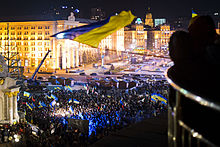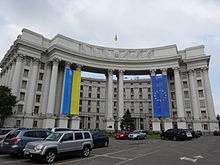Euromaidan
Euromaidan (also Euromaidan, Ukrainian Євромайдан Yevromaidan, word meaning see below; in Ukraine retrospective Revolution of Dignity, Ukrainian Революція гідності Revoljuzija hidnosti) refers to protests in Ukraine between November 2013 and February 2014. It was triggered by the surprising declaration of the Ukrainian government not to sign the Association Agreement with the European Union for the time being. The demonstrations flared up again on 29 November 2013 after it was not signed at the Eastern Partnership summit in Vilnius. The protests took on their mass character on 1 December 2013, after peaceful student protests had been dispersed with excessive violence by the Ukrainian police's special Berkut unit a day earlier. The demonstrators demanded the impeachment of President Viktor Yanukovych, early presidential elections and the signing of the Association Agreement with the European Union.
On 8 December 2013, hundreds of thousands of people took part in the demonstration on the Maidan Nesalezhnosti ("Independence Square") in Kyiv. Some media reported over one million demonstrators. Despite above-average police presence and attempts to clear the square, the protests continued. From 18 February 2014, there was an escalation which resulted in over 80 deaths. After the agreed settlement of the conflict through a treaty brokered by the foreign ministers of Germany, France and Poland on 21 February, Yanukovych fled precipitously that same night. As a result of the flight, the parliament declared President Yanukovych deposed on 22 February 2014. The Euromaidan came to an end with the appointment of Oleksandr Turchynov as interim president on 23 February and the formation of an interim government under Arseniy Yatsenyuk on 26 February, after the head of government, Azarov, had already resigned with the entire government on 28 January before the vote of no confidence in order to forestall his planned removal.
During the final phase, Russia began annexing Crimea and destabilizing the country through armed conflict in two eastern oblasts of Ukraine.

Demonstrations in Kiev on 27 November 2013
Word Meaning
The word Euromaidan consists of two parts: Euro stands for Europe and maidan refers to Majdan Nesaleshnosti (Independence Square), Kiev's central square where most of the protests took place.
The term "Euromaidan" was originally used as a hashtag on Twitter. A Twitter user profile with the name Euromaidan was already created on the first day of the protests. The name quickly became popular in the international media.
Causes
Failure to sign the Association Agreement as a cause and a trigger
The suspension of the Association Agreement by the government of President Yanukovych, which was greeted with surprise, was the trigger for the protests, but it was neither the sole concern or main concern of all the demonstrators nor the sole cause. The Gorshenin Institute in Kyiv conducted a street survey of protesters on December 2, 2013: 56 percent of respondents said they protested on the Maidan to demonstrate for the resignation of the government and president. Although respondents were allowed to name more than one reason, only 28 percent cited rejection of the EU agreement. Media reports depict demands for resignation from the very beginning. Heiko Pleines (Research Centre for Eastern Europe, University of Bremen) notes that on average from 2004 to 2014, only 30 to 40 percent of the population was in favor of EU integration. The number of supporters of rapprochement with Russia was just as high. In February 2014, support for the association agreement was 48 percent. According to their own statements, only 18 percent were well informed about the content of the agreement.
Anger among supporters of the Association Agreement was heightened by the fact that Yanukovych met Putin in Sochi to sign an agreement on financial support and lower gas prices in return for eventual accession to the Customs Union.
The pressure of Russia
Months before the signing of Ukraine's Association Agreement with the EU was due, Putin had increased the pressure on the now "disgraced" President Yanukovych in 2013 with trade sanctions, import bans and anti-EU propaganda; "with power and blackmail, President Putin had brought Ukraine under President Yanukovych back into Moscow's sphere of influence". This in view of the Eurasian Economic Union, which was supposed to bring the states of the former CIS together economically under the leadership of Russia and excluded the middle path taken by Ukraine since 1991. On Maybrit Illner, Ukrainian Ambassador Pavlo Klimkin spoke about Russia's sanctions in September 2013 and explained that joining NATO was not an option; Harald Kujat explained that the admission of the Baltic states to NATO had taken place against the US, but at Germany's insistence.
Mikheil Saakashvili confirmed the reason for Russian pressure in mid-February with a foreseeable turning point for Russia: he predicted that the Russian empire would die on the Maidan. Andrei Illarionov further predicted that if Putin did not achieve his self-imposed task of reunifying the "old Russian lands," there would be a Russian seizure of part of Ukraine analogous to Moldova and Georgia.
"Reflections" on Russian state television
On Russian Federation state television, journalist Dmitry Kiselyov had appeared and suggested to his viewers that the agreement offered by the EU to Ukraine was a plan by Poland, Sweden and Lithuania to take revenge on Russia for its defeat at the Battle of Poltava in 1709. Most Russian propaganda, however, referred to the reprehensible decadence of the West. In the fall, the Russian media stepped up the propaganda.
Reflections on EU and US policies
The political scientist Herfried Münkler said that no one in the EU had prepared for strategic counter-actors; it had been assumed that it was only a matter of "administering prosperity and enforcing human rights norms". The political scientist John J. Mearsheimer, on the other hand, took the position that the USA and the European Union had both pushed for expansion eastwards, although they had been aware of the Russian position: From the Russian point of view, EU enlargement is considered a "straw man" ("stalking horse") of NATO, thereby admittedly ignoring the right of self-determination of peoples, which Ukraine is also entitled to. The former president of the European Commission, José Manuel Barroso, said that until 2012 Russia, which had been informed in detail, had no reservations about Ukraine's accession to the EU. "Putin was overcome by fear of losing face.
Ambiguous situation and uncertainty of Ukraine
Growing pressure from Russia not only through threats and promises, but also through very concrete trade sanctions in the autumn of 2013 interacted with the EU's very high expectations and insufficient sensitivity to Ukraine's economic recession and lack of financial reserves. Added to this was the EU's lack of understanding of Ukraine's dependence on trade with Russia - which made the pressure from Russia on Ukraine even more effective. Given the economic situation, Yanukovych felt that association with the EU was too risky. Since 1991, Ukraine's foreign policy had been mainly characterized by the fact of joining neither one side nor the other. Yanukovych wanted to keep this "luxury of a multivectoral policy" open by delaying the association. This gave rise to the revolt of those who were unhappy with the decision. It was not until December that it became known that Ukraine had been promised $15 billion in credit from Russia through government bonds and a (temporary) reduction in the price of gas from $400 to $270 per 1,000 cubic meters.
On the one hand, according to a Russian statement by Sergei Yevgenevich Naryshkin, EU representatives had promised Ukraine an improvement in living standards if President Viktor Yanukovych signed the agreement; on the other hand, the EU had demanded that Kiev tighten its belt over the next ten years and prepare for mass unemployment and company closures.
Media Influence
In a 2014 interview with Washington Post journalist Lally Weymouth, then-presidential candidate (and later president) and former opposition leader Petro Poroshenko said:
"From the time I was elected to parliament, I was not voting for the government. I was sure it did not have a chance to survive. From the beginning, I was one of the organizers of the Maidan. My television channel - Channel 5 - played a tremendously important role. We gave the opportunity to the journalists to tell the truth. ... On the 11th of December, when we had [U.S. Assistant Secretary of State] Victoria Nuland and [E.U. diplomat] Catherine Ashton in Kiev, during the night they started to storm the Maidan."
"Since I was elected to Parliament, I have not voted for the government. I was sure it had no chance of survival. From the very beginning I was one of the organizers of the Maidan. My television station - Channel 5 - played a hugely important role. We gave journalists the opportunity to tell the truth. ... On December 11 (2013), when we had Victoria Nuland [head of unit at the US State Department] and EU foreign policy spokeswoman Catherine Ashton in Kiev, during that night the storm on the Maidan began."
- Petro Poroshenko interviewed by Lally Weymouth: Interview with Ukrainian presidential candidate Petro Poroshenko
Dissatisfaction with the government
- Corruption: Parts of the judicial and economic system were and are considered corrupt. Anti-corruption slogans united people from across the political spectrum - from the far left to liberals to the far right.
- Accusation of personal enrichment of the president and his family, who also fled: Yanukovych lived in a luxurious country estate. Yanukovych was able to transfer his official villa Meshyhirya, state property since Ukraine's independence in 1991, to his private ownership via companies in London and Vienna. Shortly after the 2010 election, he had a chandelier worth 8 million euros purchased.
- The weak economy of the country: On average, Ukrainians have about a tenth of the income of Germans, but paid almost the same prices.
- Allegations of electoral fraud: When Yanukovych was elected president, the OSCE did not see any electoral fraud, but the defeated Tymoshenko did not recognize the legitimacy of Yanukovych's victory. In the 2012 parliamentary elections, OSCE observers found massive violations in favour of the Party of Regions.
Institutional vacuum
The institutions, especially in the economic sphere, had been imposed by the socialist system quasi from the outside; they were controlled in the party's interest. Property rights were only enforceable to a limited extent, and fraudulent enrichment through the destruction and cannibalization of companies or the personal enrichment of management was widespread. Thus, much of the EU's appeal to Ukraine was the institutional anchor it provided.
Reorientation of the Ukrainian oligarchs
The oligarchs of the Donbass, who dominated the entire country under Yanukovych, had gradually outgrown Donetsk, the "Russian" imprint of their homeland was diluting and their economic interests had become more "Ukrainian" or even "European". Akhmetov, in particular, had outgrown the Donbass with his System Capital Management (SCM) corporation. Yanukovych had also begun to build his own rival business empire and, through his power over the courts, police, and prosecutors, became a threat to the oligarchs, especially the "Akhmetov clan" that had brought him to power.

Ukrainian Foreign Ministry building with EU flag
Search within the encyclopedia